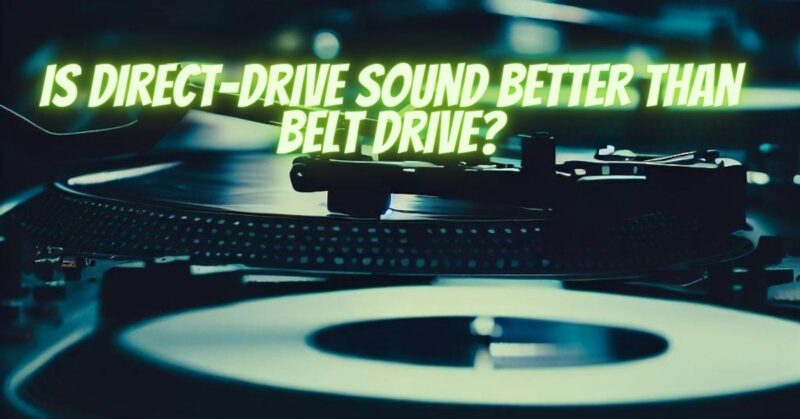The age-old debate between direct-drive and belt drive turntables has long captivated audiophiles and vinyl enthusiasts. Both technologies have their merits, and each boasts a loyal following. As the demand for vinyl continues to surge, the question remains: Is direct-drive sound better than belt drive? In this article, we delve into the key differences between these turntable designs, how they impact sound quality, and the subjective nature of sonic preferences.
Understanding Direct-Drive and Belt Drive Turntables
- Direct-Drive Turntables: In direct-drive turntables, the platter is directly connected to the motor’s spindle, resulting in a fast and precise rotation. This design is popular among DJs for its quick startup times, high torque, and stable speed control, ideal for beat-matching and scratching.
- Belt Drive Turntables: Belt drive turntables, on the other hand, use a belt to connect the motor to the platter. The belt absorbs motor vibrations, providing a smoother, more isolated rotation. Belt drive turntables are often associated with a more traditional, audiophile-oriented approach to vinyl playback.
Impact on Sound Quality
The sound quality of a turntable is influenced by numerous factors, and both direct-drive and belt drive designs can deliver excellent audio performance:
- Direct-Drive Advantages: Direct-drive turntables excel in providing consistent rotational speeds, reducing wow and flutter (speed fluctuations), and delivering accurate pitch. The stable rotation is particularly beneficial for DJs and those seeking precise playback, especially for electronic music and high-energy genres.
- Belt Drive Advantages: Belt drive turntables are often praised for their inherent isolation from motor vibrations. This design can result in lower background noise, reduced resonance, and a warmer, more organic sound. Audiophiles often appreciate the subtleties in the midrange and a more relaxed presentation on belt drive turntables.
Subjective Listening Experience
Ultimately, the question of whether direct-drive sound is better than belt drive sound is subjective and heavily reliant on personal preferences:
- Audiophile vs. DJ Listening: Audiophiles often prioritize a pure and transparent listening experience, where the emphasis lies in accurate sound reproduction and musical nuances. In contrast, DJs prioritize features like quick startup times, torque, and stability for mixing and beat-matching. Direct-drive turntables cater to the latter, while belt drive turntables cater to the former.
- Musical Genres: The choice between direct-drive and belt drive turntables can be influenced by the genres of music one primarily listens to. For genres requiring precise timing, dynamic control, and constant speed, such as dance, electronic, or hip-hop, direct-drive turntables are often favored. On the other hand, for genres that emphasize tonal accuracy, soundstage, and intricate details, such as classical, jazz, or acoustic music, belt drive turntables may be preferred.
In the ongoing debate of direct-drive vs. belt drive turntables, the answer to whether direct-drive sound is better than belt drive sound depends on individual preferences, intended use, and musical tastes. Both technologies offer distinct advantages and can deliver exceptional sound quality when properly designed and engineered. Audiophiles seeking a more traditional, organic listening experience may find solace in the subtle nuances of belt drive turntables, while DJs and enthusiasts of electronic music may gravitate towards the stability and performance of direct-drive turntables.
Ultimately, the joy of vinyl lies in its unique and immersive listening experience, regardless of the technology behind the turntable. Whether it’s the hypnotic groove of a direct-drive or the smooth melodies of a belt drive, both turntable designs contribute to the rich tapestry of vinyl’s enduring allure in the modern era of audio appreciation.


